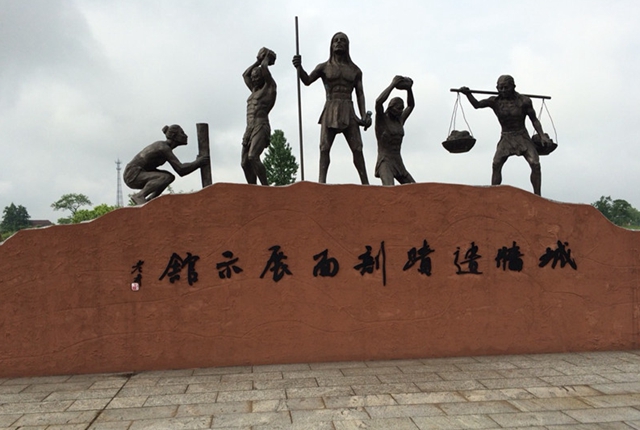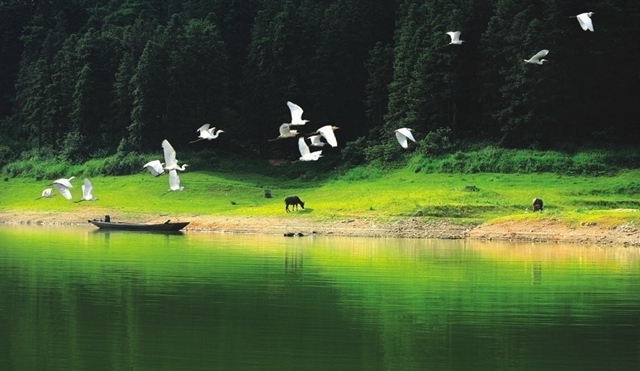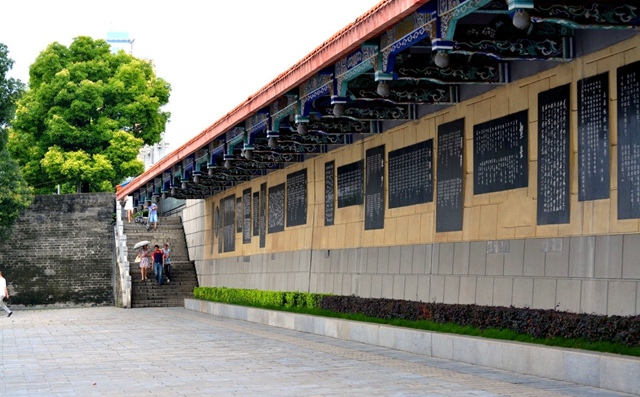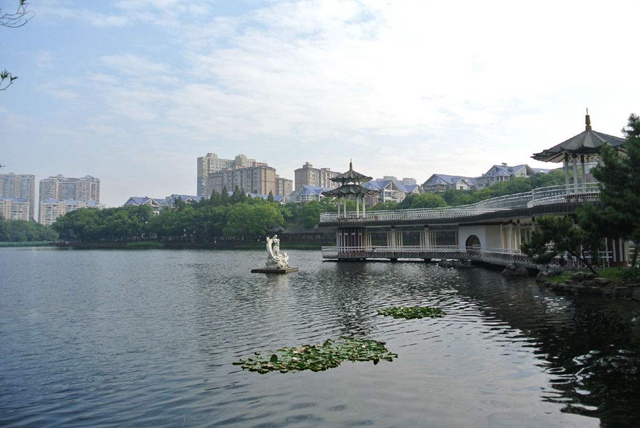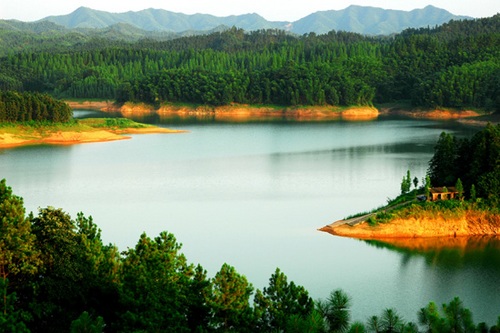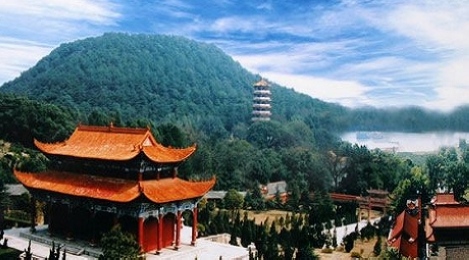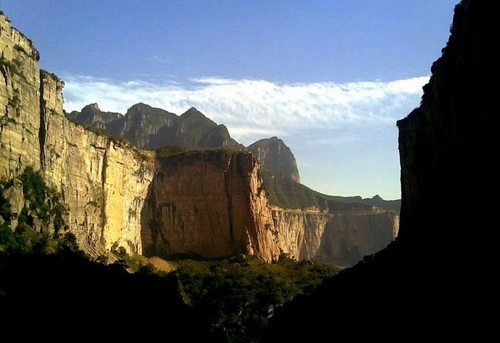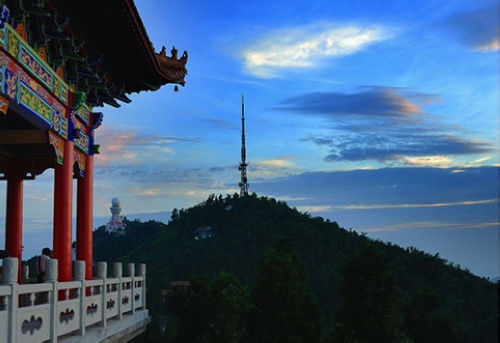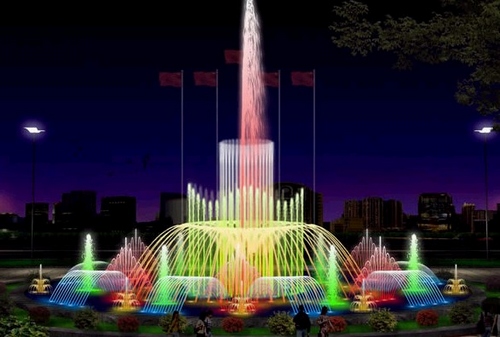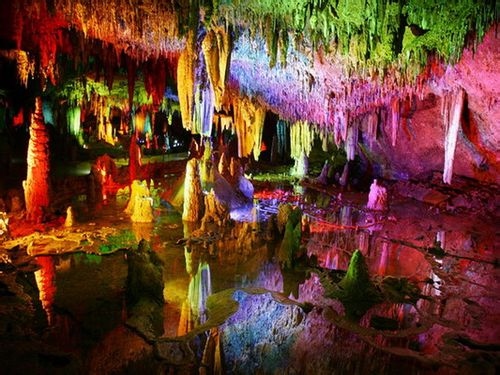Taohuayuan Fairyland is situated in National 4-A Tourism Scenic Spot Taohuayuan, Taoyuan County. Being an extraordinary geographical location, it is adjacent to Wuling on the south and Yuanjiang River on the north. Portrayed as a fairyland by the Eastern Jin Dynasty poet Tao Yuanming (about 365—427) in his famous Records of Peach Blossom Source, Taohuayuan, with a long history of more than 1600 years, is renowned at home and abroad for its pastoral beauty of its mountains and waters, and for the popularity of its temples and tablets.. Shiwaitaoyuan(世外桃源,a hidden paradise) has for generations represented mortal beings’ spiritual dwelling and ideal pursuit.
Location: Taohuayuan Tourism Resort is located in the lower reach of the Yuan River and in the southwestern part of Taoyuan County. It includes Taohua Mountain, Taoyuan Mountain, Qin Dynasty Village, Taoxian Mountain, the Lingjintan Scenic Spot, the Yiwangxi Scenic Spot, and the 69 km Yuan River Tourist Line. It has a total area of 157.55 km2. Its scenic area incorporates five villages and towns: Qinglin Village, Zhangjiang Town, Taohuayuan Town, Lingjintan Village and Xinglongjie Village.
History: Taohuayuan is the prototype of a wonderful place far from the cruel reign of the Qin Dynasty described in Records of Peach Blossom Source by Tao Yuanming, a famous poet in the East Jin Dynasty. It has a 1,600-year history and has been regarded as a Shangri-la by later generations. Taohuayuan was first built in the Jin Dynasty (256-439 A.D), began to take shape in the Tang Dynasty (618-709), flourished in the Song Dynasty (960-1297), and went to ruin in the Yuan Dynasty (1297-1368). With ups and downs through the Ming Dynasty (1368-1911), it was almost abandoned in the times of the Republic of China (1912-1949). Its restoration began in 1949 and a large-scale expansion and development began in 1990. Even 5,000-6,000 years ago, fishermen lived in the Taohuayan Scenic Area. It belonged to the Chu Kingdom in the Warring States Period, Qianzhong Shire in the Qin Dynasty, Yuannan County of Wuling Shire in the Han Dynasty, and Yuannan County of Jingzhou Wuling Shire in the Jin Dynasty. In the early Tang Dynasty, the government defined the range of the Taohuayuan Mountain. Liu Yuxi, a famous litterateur in the Tang Dynasty, often went sight-seeing in Taohuayuan and wrote Beautiful Scene of Taoyuan when he was demoted here. In the first year of the Qiande Period of the Song Dynasty (963), the government Pided the area into the middle and lower reaches of the Yuan River in Taohuayuan, and it established a new county called “Taoyuan” where there were scenic spots and historical sites. In the first year of Zhenghe, Emperor Hui of the Song Dynasty wrote “Taochuan Longevity Palace” on a stele and sent it to Taoyuanyuan. After that, it became even more famous. Even in the Yuan and Qing Dynasties and during China’s Republican Period when the area found itself intermittently in either prosperity or depression, Taohuayuan was still of great charm.
Culture: Since the birth of Records of Peach Blossom Source by Tao Yuanming in the Eastern Jin Dynasty, later generations have continually praised Taohuayuan in writing. As a result, both its scenery and the writings about it became famous. The wonderful place far from the cruel reign of the Qin Dynasty described in Records of Peach Blossom Source by Tao Yuanming was admired and praised by the later litterateurs as the prototype of “Shi Wai Tao Yuan (remote retreat)”. Many famous poets, litterateurs, officials and Taoists since the Tang Dynasty have had a special longing for it and tried their best to praise it. Such famous litterateurs as Meng Haoran, Wang Changling, Wang Wei, Li Bai, Du Mu, Liu Yuxi, Han Yu, Lu You, and Su Shi have left a legacy of many valuable poems and proses. There are now 45 volumes of various Collections of Writings about Taohuayuan and Annals of Taohuayuan from different periods, more than 2000 verses, more than 130 thousand characters of prose, 107 horizontal inscribed boards and couplets, 108 pieces of inscribed and engraved stone tablets, more than 600 paintings and more than 40 folklores about Taohuayuan.
Brand: In 1959, Taohuayuan was placed on the list of “Provincial-level Key Cultural Relics Under Protection by the Hunan Provincial Government”. In 1987, it was listed as one of the “Top Ten Scenic Spots of Hunan by the Hunan Provincial Government”; in 1992, it was approved as a National Forest Park by the Forestry Ministry of China. In 2001, it was approved to be a National AAAA Grade Scenic Spot by the National Tourism Administration of China; and in 2004, it was approved to be a Key National Scenic Spot by the State Council. On the 24th of March 1995, President Jiang Zemin came to Taohuayuan. After making an inspection tour of cultural relics and natural landscapes, he said “This is the real Taohuayuan described by Tao Yuanming” and he wrote an inscription as a memento. It was also appraised continually for 4 years as one of “the Best Scenic Spots of Hunan” and as a “Civilised Forest Park of Hunan”. In 2000, Taohuayuan was recognised as one of the 50 scenic spots you have to visit in your lifetime. On the 12th of June 1998, in the Fifth International Conference for the Grammy Awards for the Golden Tourism Lines co-held by Tourism Weeks and the Japanese Writers Association in Osaka, Japan, the tourism line of Changsha—Taohuayuan—Zhangjiajie was awarded the “Destination Special Development Award”, being one of the two awarded golden tourism lines of China.
Transportation: Taohuayuan, located in the northwestern part of Hunan Province, is the gateway to the western part of China. It is surrounded by Changsha, Shaoshan, Zhangjiajie, Three Gorges, and Western Hunan Autonomous Prefecture and has a distance of about 200 km to each of them. It has convenient air, water and land links, with the National Highway 319 running through the area, the National Highway 207 passing by its eastern part 30 km away, and is 40 km away from the Changsha-Changde Expressway, 20 km away from the Taoyuan Toll Gate on the Changde-Zhangjiajie Expressway, the Changde-Jishou Expressway and the Changde-Shaoyang Expressway, Changde-Yueyang Expressway, Changde-Jingzhou (Hubei Province) Expressway. The Yuan River, a main waterway of Hunan Province, can directly reach Yueyang and the Yangtze River by passing through the Dongting Lake. The Shimen-Changsha Railway (from Shimen to Taoyuan to Changde to Yiyang to Changsha) has a main railway station in Changde which is only 50 km away from Taohuayuan and provides a convenient connection between Taohuayan and the cities along the Beijing-Guangzhou Railway and the Jiaozuo-Liuzhou Railway. Taohuayuan Airport, a National Second Level Civil Airport, is only 34 km away from the scenic spot and has already opened airlines to Shenzhen, Guangzhou, Beijing, Shanghai, Haikou, Kunming, Chongqing and so on.
Animals and plants: Taohuayuan has a favourable environment for animals to live and has a complex food chain. It has a rich resource of animals and plants. There are 255 kinds of beautiful exhibiting animals, among which 230 are wild, forming 90% of the total, and 25 are tamed, 446 kinds of woody plants, among which 63 are peach species, forming 13.8% of the total, more than 740 kinds of herbs, among which 238 are beautiful and fragrant group plants.
Service facilities: In the Taohuayuan Tourism Resort there are more than 10 hotels and more than 30 restaurants, with a reception capacity of more than 2,000 tourists per day; there is a national primary-level power supply line, a waterworks with a production capacity of 40 thousand tons per day, Changqing Gas Station, a petrol station co-managed with the Changling Refinery, a post office, two China Mobile micro receiving towers and two China Unicom micro receiving towers and 2,000 programmed control telephone exchangers.
